In 2024, tackling indoor formaldehyde is essential for a healthy home. The top air purifiers include the Dyson Purifier Cool TP09, which offers real-time monitoring, and the Dyson Purifier Big+Quiet BP03, ideal for large spaces. For a budget-friendly option, check out the Wyze Air Purifier with a HEPA filter. The Dyson Hot+Cool HP09 not only purifies but also detects formaldehyde continuously, while the Dyson Humidify+Cool PH04 adds humidity control too. Each model presents unique features to match your needs, ensuring you breathe easy. Keep exploring to find the ideal purifier that fits your lifestyle perfectly!
Dyson Purifier Cool TP09 Air Purifier and Fan
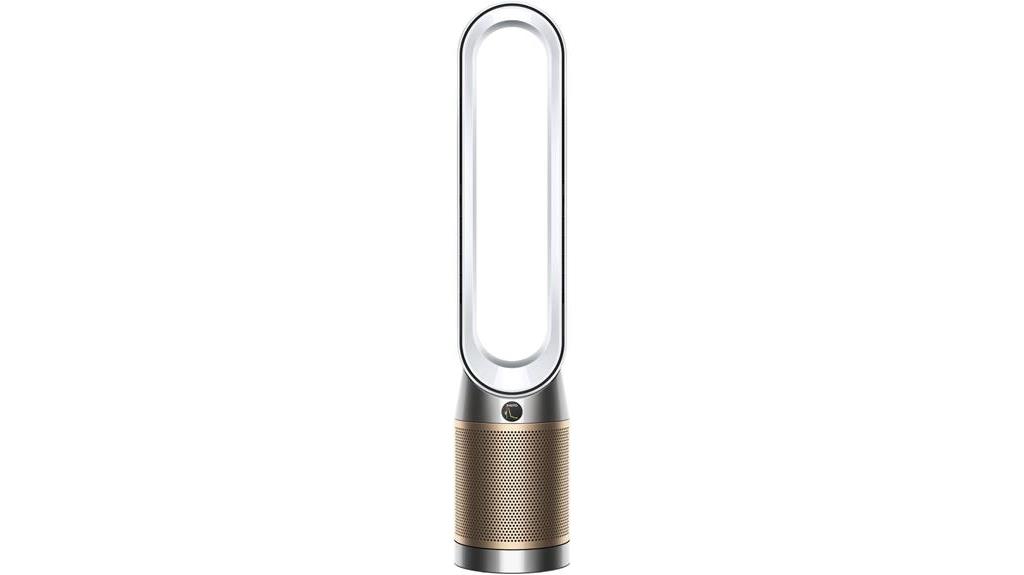
If you're someone who regularly battles allergies or is sensitive to indoor air pollutants, the Dyson Purifier Cool TP09 Air Purifier and Fan is an excellent choice for you in 2024. This innovative device not only purifies the air but also cools your space effectively. It features a HEPA H13 filter that captures 99.97% of particles as small as 0.3 microns, ensuring you breathe cleaner air. The advanced filtration system includes a formaldehyde sensor that continuously destroys harmful substances. I love how the MyDyson app lets me monitor air quality in real-time and control the device remotely. While some users mention noise at max settings, I find it operates quietly during normal use. Overall, this purifier is a must-have for cleaner indoor air.
Best For: Individuals with allergies or sensitivities to indoor air pollutants seeking an effective air purification and cooling solution.
Pros:
- Effective Filtration: HEPA H13 filter captures 99.97% of particles as small as 0.3 microns, improving overall air quality.
- Real-Time Monitoring: The MyDyson app allows users to track air quality and control the device remotely.
- Auto Mode Feature: Automatically activates based on air quality fluctuations, enhancing convenience and ease of use.
Cons:
- Noise Levels: Some users report high-pitched sounds and loud operation at maximum settings.
- Cooling Performance: Complaints regarding the effectiveness of the cooling function compared to expectations.
- Mixed Experiences with Refurbished Units: Issues with non-authentic remotes and reliability of refurbished products.
Dyson Purifier Big+Quiet Formaldehyde BP03 Extra Large
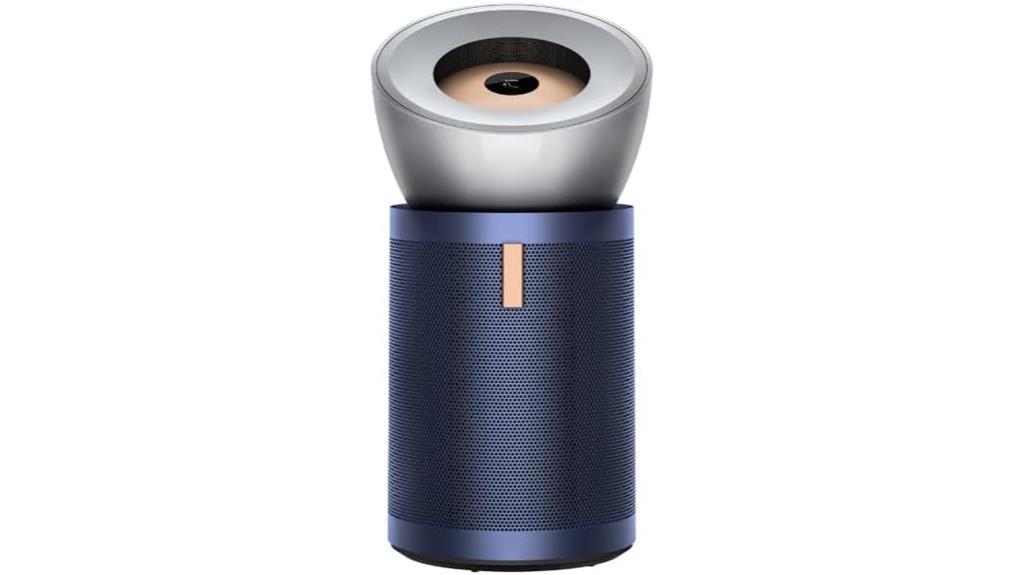
The Dyson Purifier Big+Quiet Formaldehyde BP03 Extra Large is an exceptional choice for anyone looking to maintain clean air in spacious environments. With its advanced HEPA H13 filtration, it captures 99.97% of fine particles and effectively destroys formaldehyde permanently. I love how it projects purified air over 32 feet, ensuring even large rooms feel fresh. The quiet operation is a game-changer, especially with its do not disturb mode. Plus, I can monitor air quality through the MyDyson app, which keeps me informed about PM2.5, VOCs, and more. Although the price is around $999, if you prioritize air quality in larger spaces, it's definitely worth considering for a healthier home.
Best For: Individuals seeking an effective air purifier for large spaces that prioritizes quiet operation and advanced filtration.
Pros:
- Effective Filtration: Captures 99.97% of fine particles with HEPA H13 grade filtration.
- Large Coverage: Projects purified air over 32 feet, suitable for large rooms up to 1500 sqft.
- Smart Features: Monitor air quality through the MyDyson app, tracking various pollutants.
Cons:
- High Price Point: At around $999, it may not fit every budget.
- Mixed Efficiency Feedback: Some users report concerns about dust removal and speed of purification.
- Value Perception: Reviews are mixed regarding whether it meets expectations for the price.
Wyze Air Purifier with HEPA 13 Filter
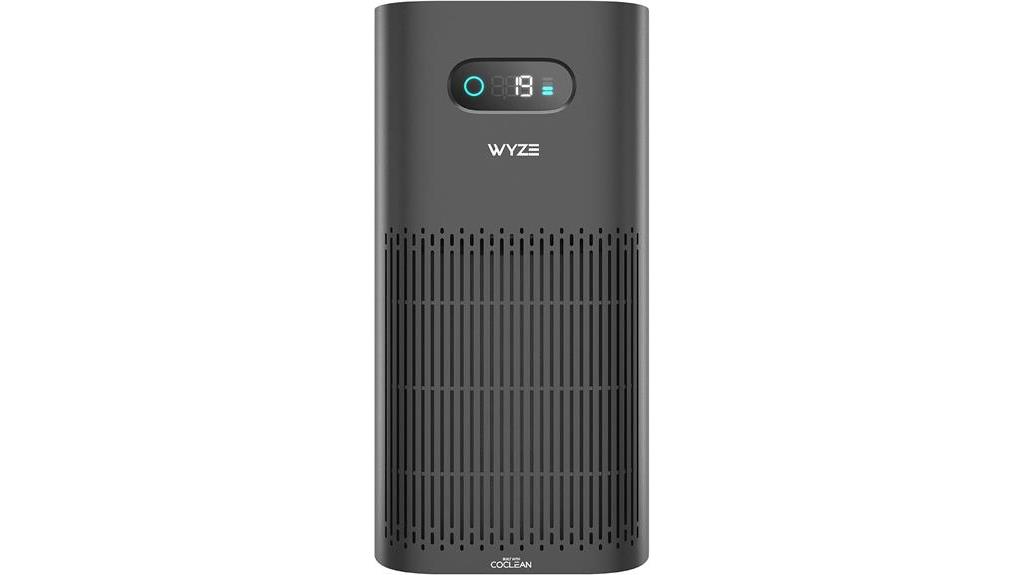
Designed for home use, the Wyze Air Purifier with HEPA 13 Filter stands out as a top choice for anyone looking to improve indoor air quality, particularly those concerned about formaldehyde and other harmful pollutants. It excels in rooms up to 500 square feet, cleaning the air over three times an hour. The whisper-quiet operation means I can run it at night without disruption, while the laser dust sensor automatically adjusts based on air quality. I appreciate the three filter options tailored to various needs, including a special filter for formaldehyde. However, I do wish for customizable fan speed scheduling in the app. Overall, it's an effective air purifier that integrates well with my smart home setup.
Best For: Those looking to enhance indoor air quality in medium-sized rooms while benefiting from smart technology and quiet operation.
Pros:
- Effective air purification for formaldehyde and other pollutants, with a high CADR suitable for large rooms.
- Whisper-quiet operation allows for use during the night without disturbing sleep.
- Smart controls and integration with other Wyze products enhance usability and monitoring.
Cons:
- Limited app features, lacking customizable fan speed scheduling and other desired functionalities.
- Lower fan speeds may be ineffective for adequate air circulation in some situations.
- Ongoing filter replacements can be a recurring expense, similar to inkjet printer cartridges.
Dyson Purifier Hot+Cool Formaldehyde™ HP09
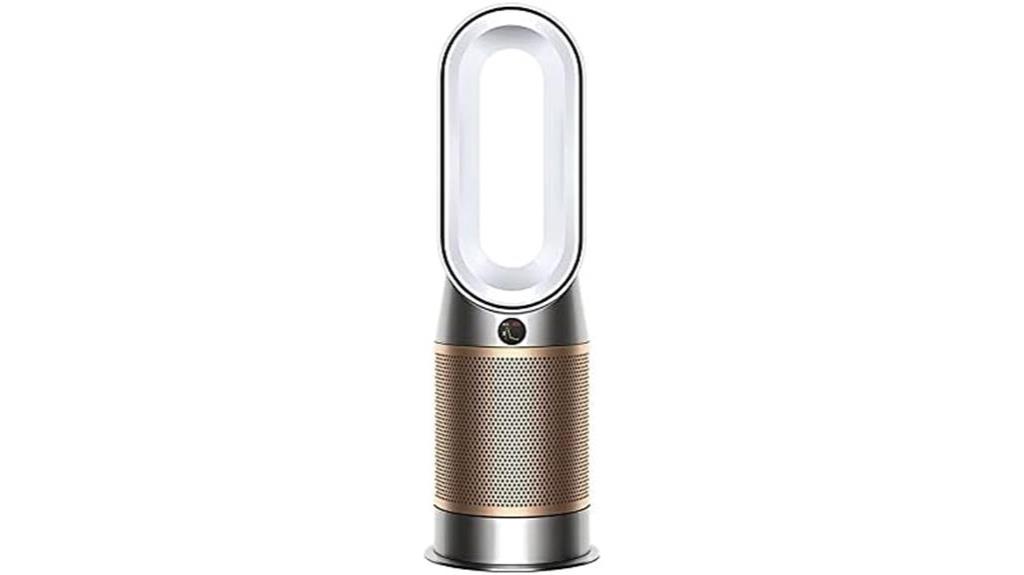
Looking for a multifunctional air purifier that tackles formaldehyde while also providing heating and cooling? The Dyson Purifier Hot+Cool Formaldehyde™ HP09 is a game-changer. With its HEPA filtration system, it captures 99.97% of particles as small as 0.3 microns and features a fully sealed design to keep contaminants contained. I love how it continuously detects and destroys formaldehyde, converting it into harmless water and CO2. The Air Multiplier Technology guarantees that purified air circulates throughout the room, while the real-time monitoring keeps me informed about air quality metrics. Plus, its ability to heat up quickly makes it perfect for colder days. With a sleek design and quiet operation, this purifier fits seamlessly into my home.
Best For: Individuals seeking a versatile air purifier that effectively removes formaldehyde while also providing heating and cooling solutions.
Pros:
- HEPA filtration system captures 99.97% of particles as small as 0.3 microns, ensuring high air quality.
- Real-time monitoring provides detailed air quality metrics, keeping users informed about their environment.
- Sleek and modern design fits well into various home aesthetics while operating quietly.
Cons:
- Higher initial cost compared to standard air purifiers without heating or cooling features.
- Filter replacement cost of $79.99 annually for the HEPA filter may add to ongoing expenses.
- Noise levels can increase at higher settings, potentially being disruptive in quiet environments.
Dyson Purifier Humidify+Cool Formaldehyde™ PH04
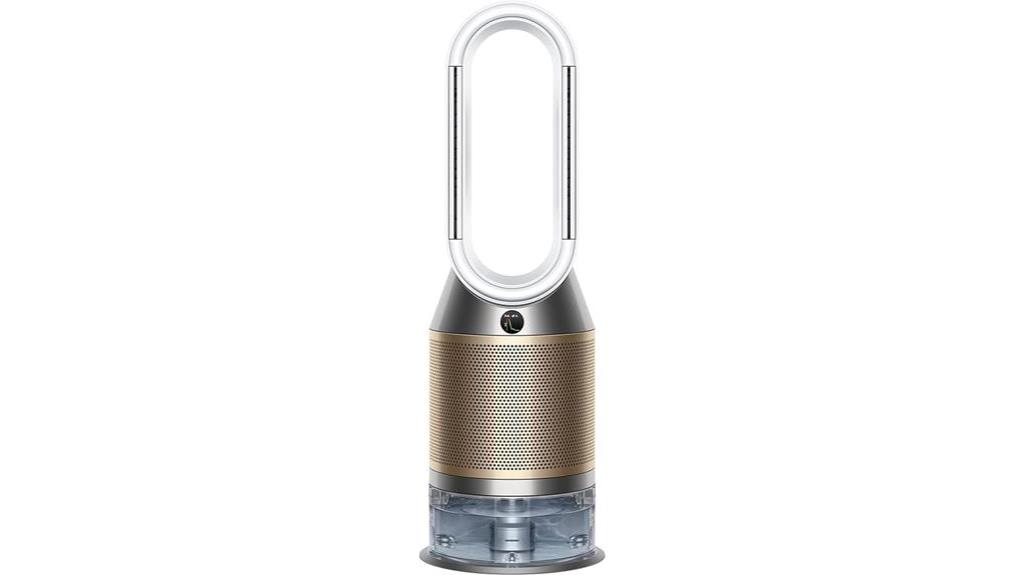
For anyone concerned about indoor air quality, the Dyson Purifier Humidify+Cool Formaldehyde™ PH04 stands out as an exceptional choice. This multifunctional device not only purifies the air but also humidifies and cools it, making it perfect for various needs. Its advanced filtration system includes a solid-state formaldehyde sensor and a HEPA filter that captures 99.97% of particles as small as 0.3 microns. I appreciate the Air Multiplier™ technology, which circulates clean, humidified air throughout the room. The sleek design fits seamlessly into my home, and the MyDyson™ app allows for easy control. While some users note limitations in humidity increase for larger spaces, the overall benefits for air quality management are undeniable. It's truly a worthy investment.
Best For: Individuals seeking to improve indoor air quality, especially those with allergies or asthma, in various environments.
Pros:
- Advanced filtration captures 99.97% of particles, improving air quality significantly.
- Multifunctional design allows for purifying, humidifying, and cooling, catering to different needs.
- Smart features like the MyDyson™ app enable remote control and real-time air quality monitoring.
Cons:
- Limited humidity increase in larger spaces may not meet everyone's expectations.
- Potential noise issues reported by some users can affect the overall experience.
- Reliability concerns have been noted, with occasional service support required.
Factors to Consider When Choosing Formaldehyde Air Purifiers
When choosing a formaldehyde air purifier, you'll want to contemplate several key factors to guarantee it meets your needs. Think about the types of filtration technology available, how well it suits your room size, and the noise levels you can tolerate. Additionally, smart features, maintenance requirements, and filter lifespan can greatly impact your overall satisfaction with the product.
Filtration Technology Types
Choosing the right filtration technology is key to tackling formaldehyde and improving your indoor air quality. Start by considering HEPA filters, which capture 99.97% of particles as small as 0.3 microns. They effectively reduce allergens and pollutants, including formaldehyde, making them a solid choice for cleaner air.
Next, look into catalytic filters. These are specifically designed to continuously destroy formaldehyde and other volatile organic compounds (VOCs), converting them into harmless substances and greatly enhancing your indoor air quality.
Activated carbon filters are another essential component, often used alongside HEPA filters. They excel at absorbing odors and chemicals, including formaldehyde, providing an extra layer of air freshness.
Don't overlook solid-state sensors, either. Air purifiers with these sensors detect formaldehyde in real-time, allowing the system to adjust filtration based on current air quality.
Room Size Compatibility
Understanding the compatibility of a formaldehyde air purifier with your room size is essential for effective air quality improvement. When choosing a model, first consider the size of your space. Some purifiers can handle areas up to 1,500 square feet, while others are better suited for smaller rooms around 500 square feet.
Next, check the Clean Air Delivery Rate (CADR), which indicates how efficiently a purifier removes airborne pollutants. A higher CADR rating typically means better performance in larger rooms, guaranteeing you breathe cleaner air more quickly.
You should also assess the airflow capacity, measured in cubic meters per hour (m³/h). This metric tells you how many times the purifier can clean the air in your room each hour. Additionally, some models utilize advanced technologies to project purified air over significant distances, enhancing coverage throughout the space.
Lastly, don't overlook your room's height. Purifiers with Air Multiplier technology can effectively circulate air in high-ceilinged or open layouts, making them ideal for various environments. By considering these factors, you'll guarantee your air purifier delivers maximum performance in your space.
Noise Level Considerations
Noise levels in formaldehyde air purifiers can greatly impact your daily life, especially if you value a quiet environment. When choosing an air purifier, it's essential to look at its noise output at various fan speeds. Some models operate as quietly as 21 decibels on low settings, making them perfect for nighttime use, while others can reach up to 54 decibels on high settings, which may disrupt your peace.
Consider how the purifier performs at different speeds. Higher settings often produce increased operational sounds that can be bothersome, especially in a serene space. Many air purifiers come with specific modes like "do not disturb" or "night mode," which reduce noise levels and dim displays, catering to users who prioritize tranquility.
User experiences with noise can vary considerably. While some models are quiet during normal operations, they might become noticeably loud when set to maximum speed. To guarantee you select a formaldehyde air purifier that fits your noise tolerance, evaluate sound ratings and available operational modes. By doing so, you can maintain a comfortable atmosphere in your home while effectively purifying the air.
Smart Features Availability
When it comes to enhancing your air purification experience, smart features can make a significant difference. Many modern formaldehyde air purifiers come equipped with real-time air quality monitoring. This allows you to track pollutants like PM2.5, VOCs, and formaldehyde through integrated displays or mobile apps, so you always know what you're breathing in.
Connectivity options like Wi-Fi and Bluetooth enable remote control and scheduling, giving you the convenience to manage your air purifier from anywhere. Advanced models often include auto mode functionalities, which automatically adjust the purifier's operation based on detected air quality changes. This means you won't have to worry about constantly monitoring air quality yourself.
Additionally, some devices provide notifications for filter life and maintenance needs, ensuring you're always informed about when to replace filters for peak efficiency. If you're invested in a smart home ecosystem, look for purifiers that integrate seamlessly with other smart devices. This integration can enhance your overall user experience by allowing for automation and control, making it easier to maintain a healthy home environment. Choosing a model with the right smart features can truly elevate your air quality management.
Maintenance and Filter Lifespan
Choosing the right formaldehyde air purifier involves considering maintenance and filter lifespan, vital factors that can greatly affect your health and wallet. Many purifiers use HEPA filters, which typically need replacing about once a year. Expect to spend around $70 to $80 for high-quality replacements. However, some models come equipped with permanent catalytic filters that continuously destroy formaldehyde without the hassle of replacement.
Regular maintenance is important for peak performance. You should clean and check the filter status frequently to extend the lifespan of your purifier. Filter longevity can vary based on usage frequency, air quality, and the presence of other pollutants. Some purifiers are designed to last up to five years under normal conditions, which can save you money in the long run.
To make your life easier, consider models with integrated smart features that monitor filter life and performance. These smart systems can alert you when replacements are necessary, ensuring you maintain consistent air quality. By keeping these maintenance and filter lifespan factors in mind, you can choose an air purifier that not only protects your health but also fits your lifestyle and budget.
Price and Budget Range
Understanding the price and budget range for formaldehyde air purifiers helps you make an informed decision. Prices can vary greatly, ranging from around $200 to over $1,000. Budget-friendly models typically offer basic filtration but may lack advanced features like real-time air quality monitoring or smart connectivity, which you'll find in higher-priced options.
When considering your budget, don't forget to factor in ongoing costs, such as replacement filters, which can set you back $30 to $80 annually. This will influence your overall investment in maintaining the air purifier. Higher-end models often come with extended warranty periods, adding value and providing peace of mind regarding your long-term investment.
It's also important to evaluate the cost-to-performance ratio. While more expensive units might seem like a larger upfront cost, they often feature superior filtration technology and greater coverage, guaranteeing effective removal of formaldehyde and other pollutants in larger spaces. Ultimately, balancing your budget with your specific needs will help you choose the right purifier that fits your requirements and guarantees cleaner air in your home.
Energy Efficiency Ratings
Energy efficiency plays a crucial role in selecting the right formaldehyde air purifier for your home. When evaluating options, consider the Clean Air Delivery Rate (CADR) alongside power consumption. This balance helps you understand how effectively a purifier cleans the air while managing energy use. Look for models with ENERGY STAR certification; this label indicates compliance with strict energy efficiency guidelines established by the U.S. Environmental Protection Agency.
High-efficiency particulate air (HEPA) filtration systems are highly effective but can vary in energy consumption. Factors like design and motor efficiency impact overall energy use, so keep those in mind. A purifier that consumes less power can greatly lower your electricity bills over time, making it a cost-effective choice.
Additionally, think about noise levels associated with different energy settings. Higher efficiency models often operate more quietly, enhancing your comfort in living spaces. By prioritizing energy efficiency, you not only guarantee cleaner air but also contribute to a more sustainable and budget-friendly home environment. So, when you shop for a formaldehyde air purifier, keep these energy efficiency ratings in mind to make a smart choice.
Design and Aesthetics
When selecting a formaldehyde air purifier, design and aesthetics often play a crucial role in your decision-making process. You want a model that seamlessly integrates into your home decor, and many purifiers now feature sleek, modern designs that complement various interior styles. A compact footprint is essential, allowing you to easily move and position the unit in different spaces without taking up too much room.
User-friendly controls and displays, like digital screens, enhance both functionality and aesthetics, improving your overall experience. Additionally, consider noise levels during operation. Quieter models are more suitable for bedrooms or living areas, ensuring your comfort while you breathe easier.
Lastly, think about color and finish options. With various choices available, you can select an air purifier that matches your personal style and home environment. Whether you prefer a minimalist white design or a bold statement piece, there's likely a model that fits your aesthetic needs. By considering these design factors, you'll find a formaldehyde air purifier that not only improves air quality but also enhances the visual appeal of your living space.
Frequently Asked Questions
How Often Should I Replace the Filters in These Purifiers?
You should replace the filters in your air purifiers every 3 to 6 months, depending on usage and the manufacturer's recommendations. If you notice a decrease in airflow or an increase in odors, it might be time to change them sooner. Keeping an eye on your filter's condition can help maintain peak performance and guarantee you're breathing clean air. Regular maintenance will keep your home environment healthy and fresh.
Do These Purifiers Make Noise During Operation?
It's funny how you might expect silence when you're trying to breathe easy, but some air purifiers can be a bit noisy. While many modern purifiers operate quietly, you'll find that noise levels vary by model. If you're sensitive to sound, check the specifications for decibel levels before purchasing. You'll want a purifier that suits your environment, ensuring it cleans the air without becoming an annoying distraction during your daily activities.
Can Formaldehyde Air Purifiers Also Remove Other Pollutants?
Absolutely, formaldehyde air purifiers can often tackle other pollutants too. Many of these devices utilize advanced filtration systems designed to capture a range of harmful substances, including volatile organic compounds (VOCs), allergens, and particulate matter. When you choose a purifier, look for models that specify their ability to filter multiple contaminants. This way, you'll guarantee cleaner air, making your living space healthier and more comfortable for you and your family.
What Is the Ideal Room Size for These Air Purifiers?
When you think of air purifiers, it's like picturing a vintage record player spinning your favorite tunes—nostalgic yet essential. The perfect room size for formaldehyde air purifiers typically ranges from small to medium spaces, about 200 to 400 square feet. If you want peak performance, make sure the unit matches your room's dimensions. Larger areas might need multiple units or a more powerful model to effectively reduce pollutants and keep the air fresh.
Are These Purifiers Energy Efficient for Continuous Use?
Yes, many air purifiers are designed to be energy efficient for continuous use. You'll find that modern models often come with Energy Star ratings, ensuring they consume less power while effectively cleaning the air. By running these purifiers continuously, you can maintain a healthier environment without greatly impacting your electricity bill. Just check the specs and reviews to find one that balances performance and energy efficiency for your needs.
Wrapping Up
In choosing an air purifier, you're not just investing in your home's air quality; you're safeguarding your family's health. Did you know that formaldehyde can be present in indoor air at levels up to five times higher than outside? By selecting one of these top purifiers, you're taking an essential step toward a safer, healthier environment. Breathe easy knowing you're protected from harmful pollutants, and make your home a haven for you and your loved ones.

Hi, I’m Charlie, and I cover all things laundry here at Appliance Mastery.
I’ve spent over eight years working on washing machines, dryers, and dishwashers. I also have a degree in mechanical engineering, which helps me understand how these appliances really work.
I try to make every guide clear and practical. If you’re stuck with a noisy dryer or a leaking washer, I’ll help you figure out what’s wrong and how to fix it.
